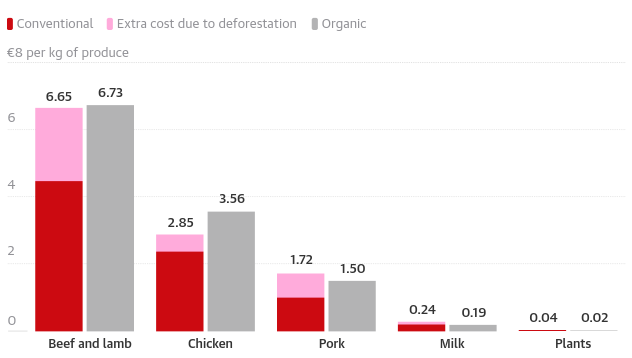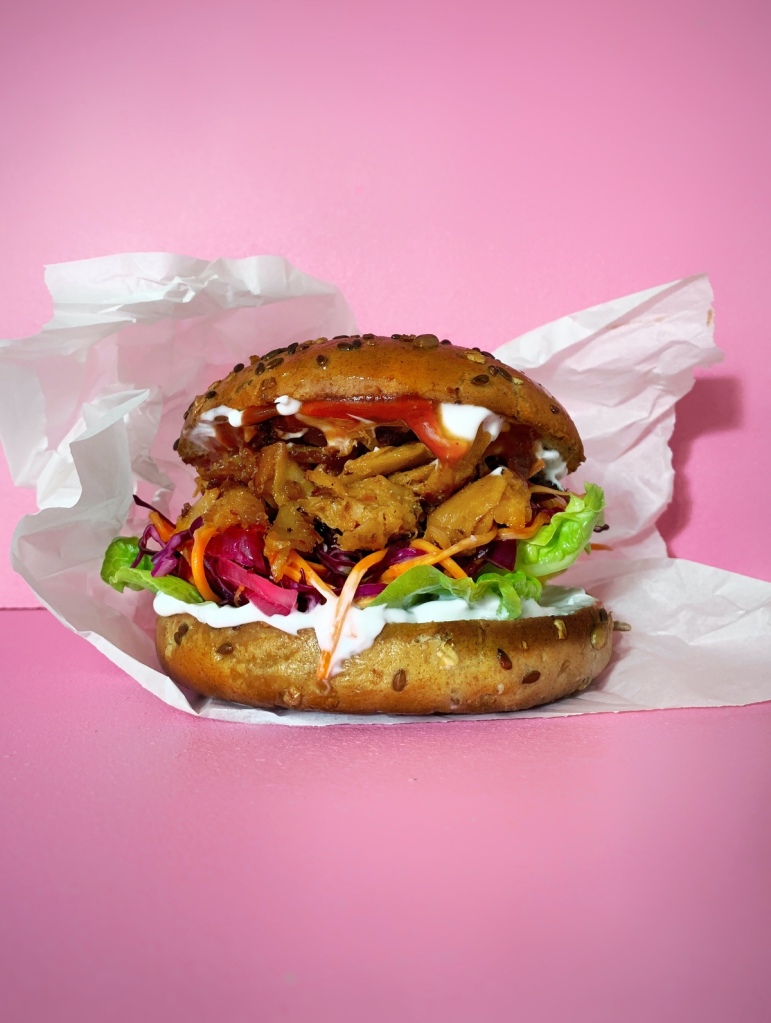By Andy Tipp
The climate crisis is the biggest issue of our time. (Okay, apart from that other thing.) Recent reports suggest that time is running out, with only a single country on track to meet climate targets. (Spoiler: it’s Gambia.)
But what can we actually do about it, individually? Is a vegan diet the answer? Can we really eat our way out of this crisis? Let’s look at the environmental impact a plant-based diet, and what we should do about it.

What the science says
Let’s cut to the chase: is a plant-based diet better for the environment?
The answer is: yes. Avoiding meat and dairy is the single biggest way to reduce your impact on Earth.
This report is based on a study from Oxford University researchers published in Science. It’s one of the most comprehensive ever studies looking at the impact of diet on the environment.
The five-year study found that meat and dairy is responsible for 60% of all agriculture greenhouse gas emissions, as well as over half of water and air pollution. It uses up 83% of global farmland, yet produces just 18% of our calories (and only 37% of our protein).
Avoiding meat and dairy could reduce your carbon footprint by 73%. It’s a far bigger impact than cutting down on flights, getting an electric car or any other change. And if everyone avoided meat and dairy it would reduce global farmland needs by 75% – an area equivalent to the US, China, the EU and Australia combined.
“A vegan diet is probably the single biggest way to reduce your impact on planet Earth, not just greenhouse gases, but global acidification, eutrophication, land use and water use.”
– Joseph Poore, Lead Author, University of Oxford
Not all meat and dairy products are equal climate offenders. By far the most damaging is beef, generating more than 30 times the volume of greenhouse gases per 100g compared to tofu (a versatile food rich in protein).

A major issue with conventionally farmed – also known as intensively or factory farmed – beef is that we have to grow plants to feed the cows. It takes 42kg of feed to produce 1kg of beef. The need to produce so much animal feed is one of the leading causes of deforestation (to clear land for crops), loss of biodiversity and species extinction.
Simply put: turning animals into food is not very efficient or sustainable. Converting grass into meat is like converting coal to energy – it comes with an immense cost in emissions.
You might think that free-range animals are better for the climate than those factory farmed. But some studies have concluded that organic meat is just as bad for the climate. Why? Well, because they’re grass-fed and not fed imported fodder they produce less meat and grow more slowly, therefore spending longer emitting greenhouse gases before slaughter.
Climate costs are similar for organic and conventional meat

You can see that according to the science, even the lowest impact meat, organic pork, is responsible for eight times more climate costs than the highest impact plants.
Where do we go from here?
Let’s go back to the original question: will going plant-based save the environment?
Well, the short answer is: no.
The slightly longer answer is: no, if everyone went vegan that wouldn’t solve the climate crisis on its own. Climate change is a complicated problem, and individual behaviour alone is not sufficient to fix it. We need systemic change. It’s not all about individual responsibility.
Having said that, cutting down on meat and dairy is part of the solution. And going fully plant-based is the single biggest environmental impact that you can have as an individual.
The need to follow a more plant-based diet is acknowledged by both the UK’s Climate Change Committee and the National Food Strategy, an independent review for government.
“The Government’s Climate Change Committee has said we must reduce the amount of meat we eat by 20–50% in order for the UK to reach net zero by 2050. In this strategy, we have set a goal of a 30% reduction over ten years.”
– UK National Food Strategy (2021)
You can see that these sources aren’t saying we need to eliminate all meat. But the point is clear: we’re in a serious crisis and one of the things we need to change is our diets.
There are many ways the UK could achieve a reduction in meat consumption: a ‘meat tax’; investing in alternative sources of protein (e.g. lab-grown meat); using subsidies to incentivise farmers to re-wild land instead of using it for animal agriculture.
“It would indeed be beneficial, for both climate and human health, if people in many rich countries consumed less meat, and if politics would create appropriate incentives to that effect.”
– Hans-Otto Portner, co-chair, UN’s Intergovernmental Panel on Climate Change
But the most obvious way to cut down on meat and dairy is by, you know, individually consuming less of it. As well as also introducing plant-based policies in our workplaces…
Adopting a plant-based policy
It won’t come as a shock that the SCC Vegan Staff Network’s official position is that Suffolk County Council should go 100% plant-based. We believe a plant-based policy would be better for the environment, based on the science. And as we’ve all said for that other thing this whole time, we should follow the science.
We’re now in talks with SCC and Vertas about the potential to follow a more plant-based catering and purchasing policy at the council. We’re also planning to engage with staff and the public to consult them about this concept. We’re looking forward to some constructive sessions and having some interesting conversations!
We know that there are all sorts of barriers to implementing a plant-based policy, including concerns over cost, health, judgemental attitudes and the perceived restrictions of plant-based food.
In terms of ‘limiting’ choices, you might be surprised to learn you can still enjoy all your favourite meals on a plant-based diet. Pizza, burgers, sausages, pies, curry, fajitas, chilli, even fish and chips… Pretty much every dish can be veganised by swapping out the meat and dairy for a plant-based alternative. For meat, that might be a ‘natural’ substitute like tofu, mushrooms or jackfruit. Or it could be a ‘fake’ meat, some of which do an incredible job of capturing the flavour, texture and appearance of real meat.
A lot of people also forget that much of the food they eat is naturally vegan anyway! Cereal, bread, rice, pasta, fruit, vegetables, legumes, nuts, seeds and salad are all consistent with a plant-based diet.
In terms of cost, a huge benefit to plant-based catering is it can be really budget-friendly. Traditional vegan staples like beans, lentils and chickpeas cost pennies, as do the spices and seasonings that can make food taste amazing with very little effort. There are lots of plant-based dishes that are cheap as chips to produce at scale, especially if some ingredients can be sourced locally and seasonally.
As for the health aspect, we won’t get into that too deeply here except to share that the British Dietetic Association – the UK’s largest organisation of food and nutrition professionals with 9,000 members – has stated repeatedly that a well-planned vegan diet is safe and healthy for all ages and stages of life.
“A balanced vegan diet can be enjoyed by children and adults, including during pregnancy and breastfeeding, if the nutritional intake is well-planned.”
– British Dietetic Association
Lastly on the judgemental aspect, all we can say is: this isn’t personal. This is about the climate crisis, the environment, and following what the science says is the biggest way to make an impact.

Plant-based policies aren’t new
We’re not the first local authority to contemplate a plant-based policy. Here are a few examples of what other councils are doing:
- Hythe and Faversham Town Councils in Kent only serve vegan food at their events.
- Enfield Council has taken meat off the menu, and all catered council functions will have vegan or vegetarian options only.
- Leeds City Council has pledged to offer more vegan meals and have two meat-free days a week in 182 primary schools.
- Lewisham Council has proposed in its Climate Emergency Action Plan only serving vegan food at corporate events, increasing the number of vegan options and adding an extra meat-free day in schools.
- Bath and North East Somerset Council have managed to improve the health and sustainability of their menus without increasing costs by serving less meat and more vegetables, legumes and pulses and by buying locally and seasonally.
Clearly some councils are ahead of where we are. The question is: what will we do next?
Will we overtake them all and jump to the front of the pack by becoming the first local authority to go 100% plant-based? Or could we at least join the pack by adopting a primarily plant-based approach, which includes some meat and dairy options?
What would you personally be prepared to accept?
Given the scale of the climate challenge as outlined in the IPCC’s latest report, surely doing nothing is not a serious option. Surely we must be prepared to take all reasonable – even radical – steps to respond to the situation. After, all we have declared a climate emergency.
This is time to be bold, ambitious and innovative (as per our WE ASPIRE values). Can we really look future generations in the eye and say we weren’t even prepared to swap our beef burgers for a vegan burger on the one or two days a week we had lunch at work?
The climate situation is truly a crisis, and we all need to think about how we’re prepared to respond as individuals and as part of a large organisation in the months and years ahead.
The Vegan Network looks forward to having a positive influence on shaping that future.

Further information
- We’d love to hear your feedback about this article. You can leave your comments below or email them to vegannetwork@suffolk.gov.uk.
- You can find out more about our network on our website, including how to get involved.
- Don’t forget to check out Jack Barber’s post: Is There a Climate Silver Lining to the Coronavirus Pandemic?
Featured image by Sonny Mauricio on Unsplash.



Really great article Andy. I was surprised and pleased to see that there were a number of councils offering Vegan and Veggie only menus. It would be great to see this happening in Suffolk CC.
LikeLike
Thanks, Simon. We shall see what happens!
LikeLike
Great article, thanks for sharing. After the great climate awareness training SCC offer, it makes sense to offer only vegan options, so fingers crossed for the future.
LikeLike
Thank you Sarah, we’ll keep people updated on how things progress. Sounding positive so far 🙂
LikeLike